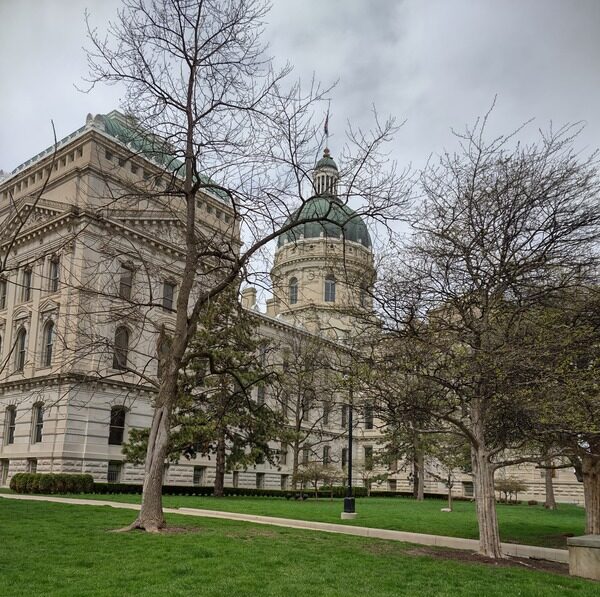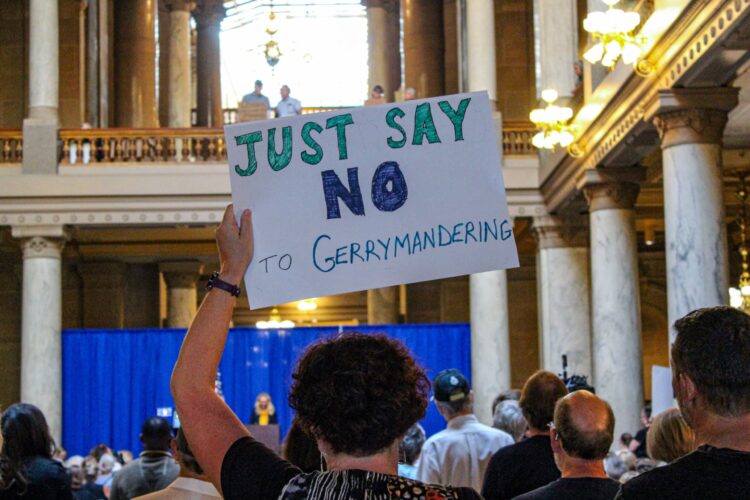
By Marilyn Odendahl
The Indiana Citizen
October 10, 2025
Despite the public outrage ignited over the prospect of mid-decade redistricting, some political experts believe state Republican lawmakers would face few consequences if they actually redraw Indiana’s congressional districts this year.
The GOP supermajority in the Indiana General Assembly is apparently still undecided about reconfiguring the congressional maps, in spite of continued pressure from President Donald Trump to turn all nine seats in the state’s congressional delegation to red and help keep the U.S. House in Republican hands after the midterm elections next year. Democratic lawmakers are crediting strong opposition from constituents with making Republican leadership in the state legislature hesitant to move forward.
However, if state Republican representatives and senators do proceed with a mid-decade redistricting, Jim Merritt, former GOP state senator and Indianapolis mayoral candidate, and Kip Tew, former chair of the Indiana Democratic Party and of the 2008 Barack Obama presidential campaign in Indiana, believe the lawmakers will not suffer many repercussions.
Tew does not see redistricting as an issue that will sway voters at the ballot box. More likely, he said, Hoosiers are going to be angry about the price of eggs and rising medical costs, which, he pointed out, have not declined, contrary to the promises made by Trump during his 2024 presidential campaign.
As a result, Tew said, the outrage among voters over the cost of living could create stiffer consequences for not redrawing the congressional boundaries. Hoosiers could express their fury on Election Day by voting against the incumbents, so Republicans might actually lose seats in Indiana unless the maps are reconfigured to boost the number of GOP-leaning districts.
“I don’t think it’s a good thing,” Tew said of mid-decade redistricting. “I don’t think it’s going to make things better. I can’t imagine it’s going to make for a more collegial atmosphere” in the legislature.
The pressure on Indiana Republicans to redo the maps is increasing with Vice President JD Vance planning another trip to the Statehouse on Friday to meet with lawmakers, according to the Indiana Capital Chronicle. Vance’s visit in August kicked off the push to redistrict in the Hoosier State and a trip to the White House in September by GOP legislators from Indiana likely intensified the arm-twisting.
Since they are a supermajority, Republicans in the Indiana General Assembly can redraw and pass new congressional districts without any support from their Democratic colleagues across the aisle.
Merritt, who served from 1990 to 2020 in the legislature, said redistricting could cause the personal relationship between lawmakers to fray even more, but they should still be able to collaborate professionally to craft and pass bills.
During the last decade of his tenure in the General Assembly, Merritt said he saw friendships and the family atmosphere decline as legislators posted “extreme comments” on social media, rather than talking to their colleagues face-to-face. Redistricting will possibly damage the camaraderie and collegiality further, he said, as Democrats scream and repeatedly question why the supermajority is redrawing the congressional districts when Republican lawmakers praised the 2021 maps that the GOP redrew.
Conversely, Merritt expects the battle to have little effect on lawmakers’ ability to work together on legislation. Lawmakers will not have as much personal stake in the redistricting, he said, because the legislative maps are not being redrawn, so the state representatives and senators will not have to worry about having to run in new districts in 2026.
“I think the friendships will be estranged just because of the overwhelming (fight),” Merritt said, “but when it comes to working relationships, I don’t think it matters because this doesn’t affect them.”
Common Cause Indiana, MADVoters Indiana and other voting-advocacy groups in the state are not backing off their own pressure campaign on Braun and lawmakers. The groups are organizing a “Rally (Again)st Redistricting” for Friday at the Statehouse and encouraging Hoosiers to attend to counter Vance’s visit.
“Hoosiers have made it clear they want no part of mid-decade redistricting, and it’s time Vice President Vance and the Trump White House listen to them,” Julia Vaughn, Common Cause Indiana executive director, said in a statement. “Rather than lowering prices and ensuring the cost of our health care coverage doesn’t triple, the vice president is focused on partisan games. On behalf of our members across the state, we are asking Vice President Vance to go back to D.C. and put his energies where they are most needed: brokering a deal to open the federal government.”

Merritt doubts the ongoing public backlash will be enough to stop Republicans, because, like Tew, he does not see redistricting as being a major issue in the 2026 election. All members of the Indiana House and about half the members of the Indiana Senate will be on the ballot next November, but Merritt said voters will probably not be demanding that incumbents explain their decision to redraw the congressional maps.
“I saw somebody dropped off 9,000 signatures to the governor’s office,” Merritt said, referring to a petition opposing redistricting that Common Cause delivered to Braun’s office in September. “That’s not going to put a dent in anybody. They’re not going to be concerned about those 9,000 people. I just don’t think that that bothers the governor or the legislature.”
Vaughn has speculated the Trump administration will start using sticks to convince Republican legislators to redistrict, since the carrots, such as the trip to the White House, have not been successful. She said the president could retaliate by denying the state’s Medicaid waiver request, which, she said, could turn vulnerable Hoosiers in need of critical health care into pawns.
Tew was skeptical Trump will cut federal dollars or programs to the state. Rather, he thinks the White House may have threatened to fund a primary challenger to run against any Indiana Republican legislator who blocks redistricting.
“I think that for individual members of the Indiana General Assembly, they would prefer not to have a primary battle,” Tew said. “I think that’s going to weigh on their minds if indeed that threat was made, which I believe it was, but I can’t prove it.”
Midterm redistricting is unusual because redrawing state legislative and congressional district maps typically occurs once a decade, after a new U.S. Census is completed. However, both Republicans and Democrats have used redistricting in the past to reconfigure the boundaries in ways that improve their party’s chances of getting their candidates elected. Such partisan redrawing of political districts is called gerrymandering.
While redistricting could cause little pain for state lawmakers, voters and taxpayers could get slammed. The ripple effect caused by redrawn maps could mean some Hoosiers will lose their voices in Congress and already sparse tax dollars will be diverted to covering the expenses incurred by a special session called to redistrict.
Republicans are targeting Indiana’s 1st and 7th congressional districts, which are currently held by Democratic Reps. Frank Mrvan and Andre Carson, respectively. Any midcycle redistricting would seek to redraw those boundaries to pull in more conservative voters and give the GOP candidates the advantage in the mid-term election.
At a recent town hall with constituents, state Rep. Ed DeLaney, D-Indianapolis, outlined his expectations if the General Assembly does redistrict. He postulated the legislative leadership would call a “hop, skip and jump session,” where lawmakers would be convened in early November to start drawing new congressional maps. A couple of other bills, which he called “fig leaves,” would be filed to provide cover, he said, so the Republicans could say they are doing more in the special session than just redistricting.
DeLaney said any such redistricting session will “cost money and it’ll cause chaos,” and it will end with litigation. Any lawsuit alleging racial gerrymandering will be filed in federal courts, he said, but, since the U.S. Supreme Court ruled in 2019 that political gerrymandering is outside the purview of the federal judiciary, the Indiana state courts will likely be handling lawsuits challenging how and when redistricting can be done.
“Our state courts … are more cautious than the average (federal) district court,” DeLaney said. The Indiana courts “are going to get hit with a lot of stuff they never had to face before. … They’re going to have a lot of pressure and we’re going to have to see if they’re willing to carry part of the load.”
The 1st and 7th congressional districts are heavily concentrated in urban areas with Mrvan representing northwest Indiana, including the cities of Gary, Hammond, East Chicago and Merrillville, and Carson representing much of Indianapolis in Marion County.
At the same town hall, state Rep. Carey Hamilton, D-Indianapolis, said in the GOP’s effort to oust the Democrats from Congress, 1st and 7th districts could be extended deep into rural parts of the state, where Republican voters are predominant. The result could be a congressional representative coming from a small farming community who does not understand the needs and demands of the residents in the urban and suburban communities also included in those gerrymandered districts.
The fallout from redistricting might also be seen in the laws the legislature produces in the future.
Tew noted that as one party has taken control of the General Assembly and statewide elected offices, ideas have given way to ideology and Indiana has fallen behind other states. Few legislators are working across the aisle to brainstorm and have a robust exchange of ideas with their colleagues in the opposite party. Such a bipartisan legislative process can bring about a better bill, he said.
“I think (Hoosiers) are all much better served when people are being practical and looking for practical solutions, rather than relying on some ideological belief that they have,” Tew said. “They fit policy into that ideological box. It ought to be the other way around: ‘How do we fix a problem?’”
Merritt agreed. He recalled being in the Statehouse when the Senate was divided between 24 Republicans and 26 Democrats, and lawmakers had to work together to get bills through to the governor’s desk.
“You didn’t get as much done,” Merritt said, “but what you got done was really meaningful.”
As for a mid-decade redistricting, Merritt said he, personally, does not think the legislature should do it. The General Assembly, he said, should follow the process for redrawing state legislative and congressional districts, which includes respecting county lines and not slicing through streets, rivers and homogeneous neighborhoods. Most importantly, redistricting requires up-to-date census data and, since that is not available in the middle of a decade, the legislators would only be guessing at where the populace is located.
“I just think there are a lot of reasons why it should not be done,” Merritt said of mid-decade redistricting. “The first thing is, I don’t think you can follow all the parameters that need to be followed. That’s where, I think, that leaves you wide open for people in the legal community to question it and … I don’t know what they’ll do if this fails in court.”
Dwight Adams, an editor and writer based in Indianapolis, edited this article. He is a former content editor, copy editor and digital producer at The Indianapolis Star and IndyStar.com, and worked as a planner for other newspapers, including the Louisville Courier Journal.
The Indiana Citizen is a nonpartisan, nonprofit platform dedicated to increasing the number of informed and engaged Hoosier citizens. We are operated by the Indiana Citizen Education Foundation, Inc., a 501(c)(3) public charity. For questions about the story, contact Marilyn Odendahl at marilyn.odendahl@indianacitizen.org.